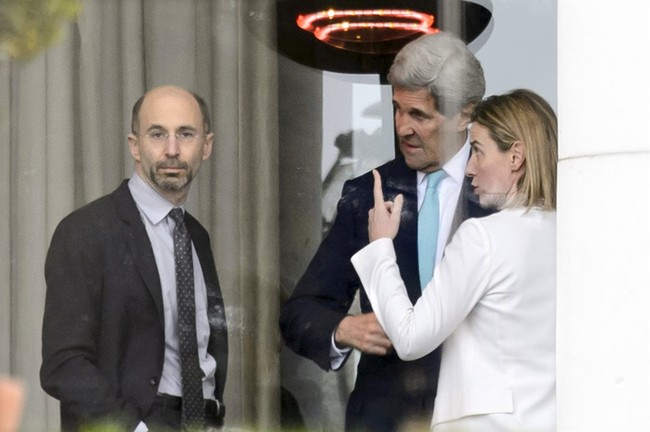Top News
State Dept Investigation of Biden’s Iran Envoy Broadens Into Probe of His Suspension

The curious suspension of Robert Malley grows even more curious — and perhaps just as curious as how he got hired at all, if not more.
Joe Biden’s special envoy to Iran got mysteriously suspended last spring by the State Department, but the White House never informed Congress of it. The Tehran Times somehow acquired and published the State Department’s suspension memo last September, much to the chagrin of Congress, which demanded some answers toute suite on Malley’s status.
Now Semafor reports that the State Department’s IG wants some answers, too. Nearly a month ago, the IG office informed the relevant congressional committees that they would expand their existing probe into Malley’s conduct to include members of the State Department involved in the suspension — and what took place afterward. This is in addition to the FBI investigation into the conduct that resulted in the suspension in the first place:
On January 23, the Inspector General’s office informed members of Congress about the probe in response to growing questions from U.S. lawmakers about Malley’s status and the reasons behind the Diplomatic Security Service’s decision to revoke his security clearance last April, according to correspondence seen by Semafor. Malley continued to perform some of the duties of the special envoy for nearly three months before the State Department officially placed him on unpaid leave in late June.
“The scope of the special review of the suspension of Robert Malley’s clearance will include the procedures the Department used in suspending the clearance as well as actions taken by the Department following the suspension,” Ryan Holden, the Inspector General’s director of congressional and public affairs, wrote in the letter. “This will include whether the Department followed proper procedures in suspending his clearance, determining what access to information he could maintain, and deciding the status of his employment.”
Holden added in his letter: “The special review will also examine which officials were involved in these decisions and how the process compares to that used for other types of employees.”
Let’s recap for those who may be unfamiliar with the saga of Rob Malley. Malley has bounced around the Democrat foreign-policy establishment since at least 1994, when he joined the Bill Clinton administration as a National Security Council adviser and worked on Cuba policy. Malley stuck with Clinton until the end of his term, after which he worked with think tanks on Middle East policy. Malley joined Barack Obama’s campaign as a supposedly “informal” adviser but was forced to resign after his meetings with Hamas came to light. He returned in 2014 to become the lead negotiator for Obama’s Iran deal, the Joint Comprehensive Plan of Action (JCPOA). Eight days after taking office, Joe Biden appointed Malley as Special Envoy to Iran, part of Biden’s efforts to revive the JCPOA.
Malley never should have been brought into any administration after meeting with and then advocating for Hamas. Perhaps that has some more clarity after October 7 than it did before, but only for those not paying attention, especially since the State Department has consistently kept the Iranian proxy on its international terrorist-organization list. Malley has been compromised intellectually since 2000, when he tried to shift blame for the failure of Clinton’s Wye River peace deal from Yasser Arafat to the Israelis. At some point Malley got compromised more traditionally through an Iranian influence operation known as the Iran Experts Initiative, which Semafor also reported in September after the Malley memo got published:
The scope and scale of the IEI project has emerged in a large cache of Iranian government correspondence and emails reported for the first time by Semafor and Iran International. The officials, working under the moderate President Hassan Rouhani, congratulated themselves on the impact of the initiative. At least two of the people on the Foreign Ministry’s list were, or became, top aides to Robert Malley, the Biden administration’s special envoy on Iran, who was placed on leave this June following the suspension of his security clearance. A third was hired by the think tank Malley ran just as he left for the State Department.
The documents offer deep and unprecedented new insights into the thinking and inner workings of Iran’s Foreign Ministry at a crucial time in the nuclear diplomacy — even as Tehran’s portrayal of events is questioned, if not flatly denied, by others involved in the IEI. They show how Iran was capable of the kind of influence operations that the U.S. and its allies in the region often conduct.
David wrote about this at the time. More than a month later, one of Malley’s proteges connected to the IEI still remained at the Pentagon — and apparently is still there. Presumably, the IEI is part of the FBI’s investigation into Malley, so it’s curious why Ariane Tabatabai remains in a sensitive defense post. That will be outside of the State IG’s scope, of course, but if they start probing the White House’s actions in covering up Malley’s suspension, they may come back to the IEI and all others connected to it at some point, regardless of which agency employs them.
The FBI probe will likely be more fruitful, if and when we ever see it, when it comes to Malley himself and his actions. But this expansion of the IG’s probe gives us an indication that they’re seeing red flags elsewhere in State and possibly up the chain.
Read the full article here


















